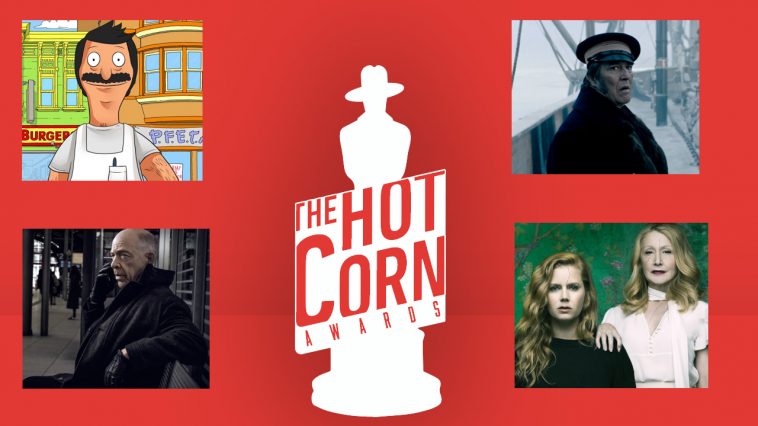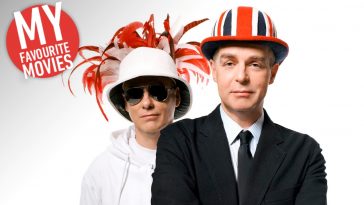20. FOREVER – It’s not exactly new to examine how even the most exciting relationships turn stale, but Forever took the concept and came at it from a completely unexpected angle. To say any more would ruin the impact of the superb second episode – Amazon gave strict instructions to press on what they could and couldn’t say prior to release, which was a little out of the ordinary for a dramedy about marital ennui. Twists and turns aside, Forever was frequently charming, sometimes moving and always watchable, thanks to exceptional central performances from Maya Rudolph and Fred Armisen.
19. GET SHORTY – If Fargo can be turned into an exceptional series, why not Get Shorty? Well, there are plenty of reasons why this shouldn’t have worked, but EPIX’s show takes the central premise (low level gangster wants to make movies) and changes almost everything else in order to draw it out into two smart, funny, entertaining seasons of TV. Chris O’Dowd and Ray Romano both deliver in spades as the gangster/Hollywood director thrown together, but the real star is Sean Bridgers (Deadwood, Rectify) as O’Dowd’s Mormon partner, a man whose best intentions usually just end up in extreme violence.
18. FLINT TOWN – I don’t know if you watch the news, but America seems kind of f***ed at the moment. Nowhere in the country is this more acutely felt than in Flint, Michigan, a city where government shenanigans resulted in mass poisoning of its citizens via a contaminated water supply. This breathtakingly bleak look at the city’s police force finds men and women who are scared, underfunded and at war with the people they’re supposed to be protecting. It’s a no-win situation that gets right to the heart of the country’s problems via one case study of a city in ruins.
17. A VERY ENGLISH SCANDAL – The Night Manager, Bodyguard, Collateral, Informer, BBC drama is often held in such disproportionately high esteem that it gets hard to figure out which ones are genuinely worth watching. This one. Based on a story too bonkers not to be true, the very English scandal at the heart of A Very English Scandal involves Liberal MP Jeremy Thorpe (a never better Hugh Grant) and his secret relationship with the very sensitive, quite highly strung Norman Josiffe (Ben Whishaw) at a time when homosexuality was still illegal in the UK. The ensuing fallout is baffling in its complexity and stupidity and will ensure you never see Paddington 2 in the same way again.
16. THE GOOD PLACE – This time last year, The Good Place would have been in the top ten, if not the top five. Dropping to 17 suggests a huge drop-off in quality, which isn’t exactly the case. This is still one of the smartest, funniest comedies on TV but season three has found the show on shakier ground, especially as it reached the mid-season break without really getting anywhere. Still, a shaky The Good Place is better than 99% of other comedy shows, especially when with the dream team of D’Arcy Carden and Ted Danson.
15. THE LETDOWN – One of the biggest surprise delights of 2018, The Letdown is a rare creature in that it depicts parenthood not as a series of nightmarish trials or unadulterated joy, but a rollercoaster that rattles between the two at terrifying, confusing, exhausting speed. One second you’re laughing at being peed on, the next you’re crying because you’re covered in pee. Alison Bell (who co-created the series with Sarah Scheller) is an utter revelation as Audrey, a new mum who realises her theory of pragmatic parenting isn’t as easy to execute in practice.
14. SUCCESSION – There’s a perverse joy in watching awful people being awful to each other, but there’s never been as awful a bunch as the Roy family. Led by Logan Roy (Brian Cox as a very thinly veiled version of Rupert Murdoch), as ruthless a patriarch as he is a media magnate, the family is a squabbling, self-obsessed, viciously disloyal bunch jockeying for position to take control when their father steps aside. Sarah Snook and Keiran Culkin are particularly wonderful as Roy siblings Shiv and Roman, while Matthew Macfadyen is a hoot as Snook’s husband, either a hateful kiss-ass or bully, depending on who he’s dealing with. But it’s Jeremy Strong who impresses most as eldest son Kendall, the one member of the family with any semblance of humanity left.
13. MANIAC – Twisty, heady psychological dramas, even ones as funny as Maniac, often come at the expense of emotional connection, but that couldn’t be further from the truth here. For all of Maniac’s copious weirdness (mostly thanks to Justin Theroux), it’s proven remarkably adept at crippling emotional blows, like the devastatingly brutal one that ends episode two. It’s frequently very funny but almost funnier for the fact that its focus is always elsewhere. And if there was anyone left in any doubt about Jonah Hill and Emma Stone’s acting chops, consider those qualms firmly put to bed.
12. HOMECOMING – Homecoming was primarily touted as Julia Roberts’ big move onto the small screen, but it’s so beautifully understated that it almost succeeds despite its megastar, rather than because of her. Make no mistake, Roberts is superb as Heidi, a counsellor at a facility that helps military personnel readjust to civilian life, but a less subtle actress could have overwhelmed this quiet, slow-burning wonder. It unfolds ever so deliberately, allowing the weight of each revelation to hit home with maximum force. That this isn’t in our top ten is only further proof that this has been a truly outstanding year for TV.
11. BASKETS – If I could write about Baskets every single week, I would. Zach Galifianakis has long excelled as a sad clown, but his stunning FX show gives him the opportunity to literally play a sad clown. Chip Baskets is all blustery, deluded arrogance (despite failing horribly at a French clowning school) but the deeply sad, lonely and sensitive man beneath all that came to the fore more and more over the course of the show’s wonderful third season. Christine (an always exceptional Louis Anderson) buys the failed rodeo to run with her sons (Chip and his far more tragically awful brother Dale), leading to hilarious catastrophe after hilarious catastrophe, none more catastrophic or hilarious than her TV interview alongside a heavily drugged-up Dale or ageing cowboy Eddie’s drunken incident with the Korean church next door.
 Barry – The premise (Bill Hader stars as a hitman who discovers he really wants to be an actor) sounds like your average high concept comedy, but Barry is one of the most deceiving shows of the year. Yes, it’s incredibly funny, but that’s balanced with a surprising willingness to venture into the dark heart of a man who has killed a LOT of people and can never rule that out as a solution to a problem. Hader and co-star Henry Winkler deservedly won Emmys for their performances, but the whole cast is wonderful, especially Stephen Root as Barry’s ‘handler’ and Anthony Carrigan and Glenn Fleshler as bizarrely endearing Chechen gangsters.
Barry – The premise (Bill Hader stars as a hitman who discovers he really wants to be an actor) sounds like your average high concept comedy, but Barry is one of the most deceiving shows of the year. Yes, it’s incredibly funny, but that’s balanced with a surprising willingness to venture into the dark heart of a man who has killed a LOT of people and can never rule that out as a solution to a problem. Hader and co-star Henry Winkler deservedly won Emmys for their performances, but the whole cast is wonderful, especially Stephen Root as Barry’s ‘handler’ and Anthony Carrigan and Glenn Fleshler as bizarrely endearing Chechen gangsters.
 Killing Eve – Another dark comedy about an assassin and one that would make a wonderful double bill with Barry. Sandra Oh is utterly brilliant as the titular Eve, an MI5 operative trying to track down an elusive assassin, but it’s Jodie Comer who is the revelation here. After decent performances in average fare like Dr Foster and Thirteen, she reaches new heights as the delightfully psychopathic Villanelle, a killer who views the rest of humanity the way a cat views a wounded mouse.
Killing Eve – Another dark comedy about an assassin and one that would make a wonderful double bill with Barry. Sandra Oh is utterly brilliant as the titular Eve, an MI5 operative trying to track down an elusive assassin, but it’s Jodie Comer who is the revelation here. After decent performances in average fare like Dr Foster and Thirteen, she reaches new heights as the delightfully psychopathic Villanelle, a killer who views the rest of humanity the way a cat views a wounded mouse.
 Bob’s Burgers – Bob’s Burgers is always wonderful but the show’s eighth season was especially wonderful, hitting the mark time and time again with brilliant episodes like Louise and Milly’s Silence Of The Lambs parody, Linda’s “mom-nipotent Mothers’ Day”, Tina’s adventures in lifeguarding and the hysterically funny season finale. Season nine has continued the winning streak but it’s likely that season eight will go down in animation history (alongside The Simpsons season six) as one of the greats.
Bob’s Burgers – Bob’s Burgers is always wonderful but the show’s eighth season was especially wonderful, hitting the mark time and time again with brilliant episodes like Louise and Milly’s Silence Of The Lambs parody, Linda’s “mom-nipotent Mothers’ Day”, Tina’s adventures in lifeguarding and the hysterically funny season finale. Season nine has continued the winning streak but it’s likely that season eight will go down in animation history (alongside The Simpsons season six) as one of the greats.
 Atlanta Robbin’ Season – Atlanta is repeatedly referred to as uncategorizable, as if that’s its sole reason for being. It certainly is hard to pin down but its diverse, eclectic nature isn’t its defining trait, rather it’s how all of these seemingly disconnected parts amount to a coherent and fascinating statement on what it’s like to be black and ambitious in modern day America. Along the way, it covers loyalty, depression, fame and identity with a panache that few other shows would even attempt. Widening the show’s focus in order to spend more time with Alfred (aka Paper Boi) turns out to be a stroke of genius, allowing Brian Tyree Henry to really shine. The Teddy Perkins episode is the one that got people talking, but ‘Woods’ is Atlanta and Henry at their weird, wonderful, thought-provoking best.
Atlanta Robbin’ Season – Atlanta is repeatedly referred to as uncategorizable, as if that’s its sole reason for being. It certainly is hard to pin down but its diverse, eclectic nature isn’t its defining trait, rather it’s how all of these seemingly disconnected parts amount to a coherent and fascinating statement on what it’s like to be black and ambitious in modern day America. Along the way, it covers loyalty, depression, fame and identity with a panache that few other shows would even attempt. Widening the show’s focus in order to spend more time with Alfred (aka Paper Boi) turns out to be a stroke of genius, allowing Brian Tyree Henry to really shine. The Teddy Perkins episode is the one that got people talking, but ‘Woods’ is Atlanta and Henry at their weird, wonderful, thought-provoking best.
 Kidding – Jim Carrey and Michel Gondry should only ever work together. As good as they can be individually, they never quite reach the standards they do when they combine forces. Carrey delivers his best work in over a decade as Mr Rogers-meets-Sesame Street type Jeff Pickles, who is struggling with grief and the collapse of his marriage. His father/boss (a brilliant Frank Langella) and sister/colleague (an equally brilliant Catherine Keener) desperately try to keep the show on the rails, even as it becomes clear it’s only making things worse. It’s surreal, hilarious and will repeatedly break your heart into a thousand little pieces.
Kidding – Jim Carrey and Michel Gondry should only ever work together. As good as they can be individually, they never quite reach the standards they do when they combine forces. Carrey delivers his best work in over a decade as Mr Rogers-meets-Sesame Street type Jeff Pickles, who is struggling with grief and the collapse of his marriage. His father/boss (a brilliant Frank Langella) and sister/colleague (an equally brilliant Catherine Keener) desperately try to keep the show on the rails, even as it becomes clear it’s only making things worse. It’s surreal, hilarious and will repeatedly break your heart into a thousand little pieces.
 THE AMERICANS – Over six seasons, The Americans has resolutely stuck to a pace that saw it regularly overtaken by glaciers, mobility scooters and stoned sloths. For some, that’s an understandable deal-breaker but if you can adapt to its ways, there are enormous rewards on offer. As we near the end of the Cold War and various nets tighten around the Jennings family, the inevitable end looms, but still The Americans refuses to rush towards the finish line, amplifying the tension through the slow, slow burn. Matthew Rhys and Keri Russell delivered acting masterclasses in every single episode of the show’s run, but the sixth season belongs to Rhys, as a conflicted Philip faces up to the true nature of his loyalties.
THE AMERICANS – Over six seasons, The Americans has resolutely stuck to a pace that saw it regularly overtaken by glaciers, mobility scooters and stoned sloths. For some, that’s an understandable deal-breaker but if you can adapt to its ways, there are enormous rewards on offer. As we near the end of the Cold War and various nets tighten around the Jennings family, the inevitable end looms, but still The Americans refuses to rush towards the finish line, amplifying the tension through the slow, slow burn. Matthew Rhys and Keri Russell delivered acting masterclasses in every single episode of the show’s run, but the sixth season belongs to Rhys, as a conflicted Philip faces up to the true nature of his loyalties.
 COUNTERPART – There’s another great double bill here: Counterpart and The Americans. Both refuse to make life easy for their viewers, both find exciting ways to tackle espionage and skulduggery and both are surprisingly moving. JK Simmons delivers a powerful and nuanced performance as Howard Silk, a low-level UN worker embroiled in a cross-dimensional conspiracy, and as Howard Silk, his gruff counterpart from a parallel world. We recently raved about season one, but in case you missed it: watch this now!
COUNTERPART – There’s another great double bill here: Counterpart and The Americans. Both refuse to make life easy for their viewers, both find exciting ways to tackle espionage and skulduggery and both are surprisingly moving. JK Simmons delivers a powerful and nuanced performance as Howard Silk, a low-level UN worker embroiled in a cross-dimensional conspiracy, and as Howard Silk, his gruff counterpart from a parallel world. We recently raved about season one, but in case you missed it: watch this now!
 SHARP OBJECTS – While shows like The Handmaid’s Tale took a more literal approach to portraying the pitfalls of underestimating women, Jean Marc Vallée’s adaptation of Gillian Flynn’s novel tackled it from a subtler, eerier direction. Sharp Objects used the auspices of a murder investigation to delve deep into the bizarre conventions and toxic expectations of small-town America. Amy Adams is both brittle and delicate as the reporter drawn back into her strange family circle and a claustrophobic nightmare that unfolds slowly, right up until its shocking climax. More haunting than a thousand ghost stories, Sharp Objects lingers like the smell of rotting meat on a hot day.
SHARP OBJECTS – While shows like The Handmaid’s Tale took a more literal approach to portraying the pitfalls of underestimating women, Jean Marc Vallée’s adaptation of Gillian Flynn’s novel tackled it from a subtler, eerier direction. Sharp Objects used the auspices of a murder investigation to delve deep into the bizarre conventions and toxic expectations of small-town America. Amy Adams is both brittle and delicate as the reporter drawn back into her strange family circle and a claustrophobic nightmare that unfolds slowly, right up until its shocking climax. More haunting than a thousand ghost stories, Sharp Objects lingers like the smell of rotting meat on a hot day.
 THE TERROR – Horror is notoriously tricky to pull off on TV. Sustaining tension over 90 minutes is one thing, but it’s a completely different ballgame to find the perfect pitch over a whole season. The Terror achieves this and then some, creating a blinding blizzard of fear, tension and dread that creeps back and forward between waking nightmare and fever dream. Taking the true story of two British ships that mysteriously vanished in the Arctic circle in 1845, The Terror concocts a terrifying tale of monsters and monstrous men that proved utterly addictive.
THE TERROR – Horror is notoriously tricky to pull off on TV. Sustaining tension over 90 minutes is one thing, but it’s a completely different ballgame to find the perfect pitch over a whole season. The Terror achieves this and then some, creating a blinding blizzard of fear, tension and dread that creeps back and forward between waking nightmare and fever dream. Taking the true story of two British ships that mysteriously vanished in the Arctic circle in 1845, The Terror concocts a terrifying tale of monsters and monstrous men that proved utterly addictive.
 BETTER CALL SAUL – Really, you could probably take the top 15 of these 20 shows and rearrange them however you like. What elevates Better Call Saul to the top of the pile? It could be expectations; nobody gave the show a chance of outpacing Breaking Bad, but season four did just that. It could be that Jimmy McGill’s fall from grace has been so gradual and so agonising that we feel like a part of ourselves has been lost along the way. It could be how Rhea Seehorn’s Kim Wexler breaks our hearts without eliciting an ounce of pity. It could be how Vince Gilligan’s storytelling has been refined to a piercingly sharp point. It’s all of these things and more. Jimmy McGill started as a likeable block, but Better Call Saul has chipped and chipped away at that block and found an amoral, selfish, duplicitous shark underneath. We always knew he was there, we just desperately wanted it all to work out differently.
BETTER CALL SAUL – Really, you could probably take the top 15 of these 20 shows and rearrange them however you like. What elevates Better Call Saul to the top of the pile? It could be expectations; nobody gave the show a chance of outpacing Breaking Bad, but season four did just that. It could be that Jimmy McGill’s fall from grace has been so gradual and so agonising that we feel like a part of ourselves has been lost along the way. It could be how Rhea Seehorn’s Kim Wexler breaks our hearts without eliciting an ounce of pity. It could be how Vince Gilligan’s storytelling has been refined to a piercingly sharp point. It’s all of these things and more. Jimmy McGill started as a likeable block, but Better Call Saul has chipped and chipped away at that block and found an amoral, selfish, duplicitous shark underneath. We always knew he was there, we just desperately wanted it all to work out differently.

























Leave a Comment